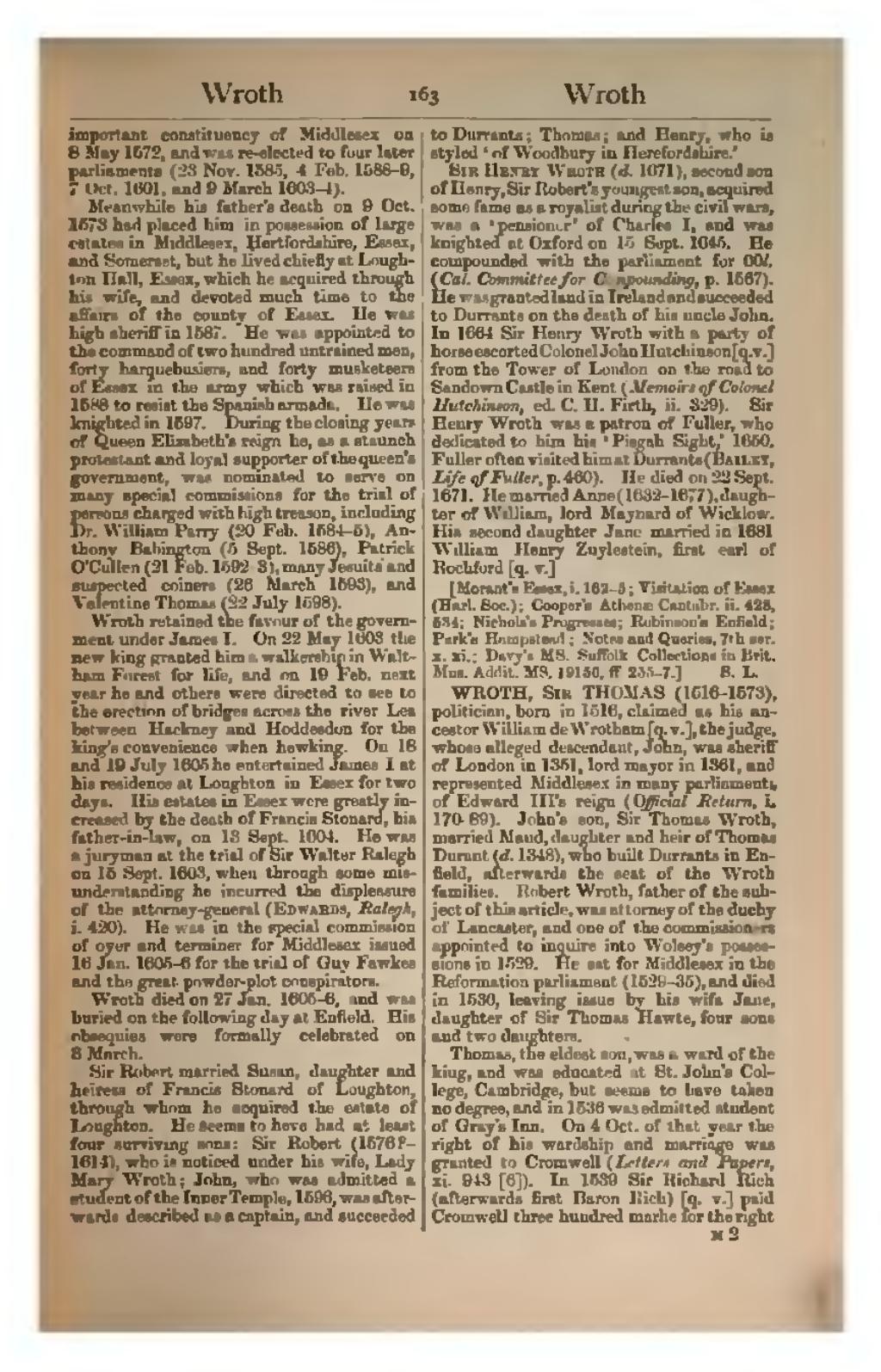important constituency of Middlesex on 8 May 1572, and was re-elected to four later parliaments (23 Nov. 1585, 4 Feb. 1588–9, 7 Oct. 1601, and 9 March 1603–4).
Meanwhile his father's death on 9 Oct. 1573 had placed him in possession of large estates in Middlesex, Hertfordshire, Essex, and Somerset, but he lived chiefly at Loughton Hall, Essex, which he acquired through his wife, and devoted much time to the affairs of the county of Essex. He was high sheriff in 1587. He was appointed to the command of two hundred untrained men, forty harquebusiers, and forty musketeers of Essex in the army which was raised in 1588 to resist the Spanish armada. He was knighted in 1597. During the closing years of Queen Elizabeth's reign he, as a staunch protestant and loyal supporter of the queen's government, was nominated to serve on many special commissions for the trial of persons charged with high treason, including Dr. William Parry (20 Feb. 1584–5), Anthony Babington (5 Sept. 1586), Patrick O'Cullen (21 Feb. 1592–3), many Jesuits and suspected coiners (26 March 1593), and Valentine Thomas (22 July 1598).
Wroth retained the favour of the government under James I. On 22 May 1603 the new king granted him a walkership in Waltham Forest for life, and on 19 Feb. next year he and others were directed to see to the erection of bridges across the river Lea between Hackney and Hoddesdon for the king's convenience when hawking. On 18 and 19 July 1605 he entertained James I at his residence at Loughton in Essex for two days. His estates in Essex were greatly increased by the death of Francis Stonard, his father-in-law, on 13 Sept. 1604. He was a juryman at the trial of Sir Walter Ralegh on 15 Sept. 1603, when through some misunderstanding he incurred the displeasure of the attorney-general (Edwards, Ralegh, i. 420). He was in the special commission of oyer and terminer for Middlesex issued 16 Jan. 1605–6 for the trial of Guy Fawkes and the great powder-plot conspirators.
Wroth died on 27 Jan. 1605–6, and was buried on the following day at Enfield. His obsequies were formally celebrated on 3 March.
Sir Robert married Susan, daughter and heiress of John Stonard of Loughton, through whom he acquired the estate of Loughton. He seems to have had at least four surviving sons: Sir Robert (1576?–1614), who is noticed under his wife, Lady Mary Wroth [q. v.]; John, who was admitted a student of the Inner Temple, 1596, was afterwards described as a captain, and succeeded to Durrants; Thomas; and Henry, who is styled ‘of Woodbury in Herefordshire.’
Sir Henry Wroth (d. 1671), second son of Henry, Sir Robert's youngest son, acquired some fame as a royalist during the civil wars, was a ‘pensioner’ of Charles I, and was knighted at Oxford on 15 Sept. 1645. He compounded with the parliament for 60l. (Cal. Committee for Compounding, p. 1567). He was granted land in Ireland and succeeded to Durrants on the death of his uncle John. In 1664 Sir Henry Wroth with a party of horse escorted Colonel John Hutchinson [q. v.] from the Tower of London on the road to Sandown Castle in Kent (Memoirs of Colonel Hutchinson, ed. C. H. Firth, ii. 329). Sir Henry Wroth was a patron of Fuller, who dedicated to him his ‘Pisgah Sight,’ 1650. Fuller often visited him at Durrants (Bailey, Life of Fuller, p. 460). He died on 22 Sept. 1671. He married Anne (1632–1677), daughter of William, lord Maynard of Wicklow. His second daughter Jane married in 1681 William Henry Zuylestein, first earl of Rochford [q. v.]
[Morant's Essex, i. 162–5; Visitation of Essex (Harl. Soc.); Cooper's Athenæ Cantabr. ii. 428, 534; Nichols's Progresses; Robinson's Enfield; Park's Hampstead; Notes and Queries, 7th ser. x. xi.; Davy's MS. Suffolk Collections in Brit. Mus. Addit. MS. 19156, ff. 255–7.]
WROTH, Sir THOMAS (1516–1573), politician, born in 1516, claimed as his ancestor William de Wrotham [q. v.], the judge, whose alleged descendant, John, was sheriff of London in 1351, lord mayor in 1361, and represented Middlesex in many parliaments of Edward III's reign (Official Return, i. 170–89). John's son, Sir Thomas Wroth, married Maud, daughter and heir of Thomas Durant (d. 1348), who built Durrants in Enfield, afterwards the seat of the Wroth families. Robert Wroth, father of the subject of this article, was attorney of the duchy of Lancaster, and one of the commissioners appointed to inquire into Wolsey's possessions in 1529. He sat for Middlesex in the Reformation parliament (1529–35), and died in 1536, leaving issue by his wife Jane, daughter of Sir Thomas Hawte, four sons and two daughters.
Thomas, the eldest son, was a ward of the king, and was educated at St. John's College, Cambridge, but seems to have taken no degree, and in 1536 was admitted student of Gray's Inn. On 4 Oct. of that year the right of his wardship and marriage was granted to Cromwell (Letters and Papers, xi. 943 [6]). In 1539 Sir Richard Rich (afterwards first Baron Rich) [q. v.] paid Cromwell three hundred marks for the right
